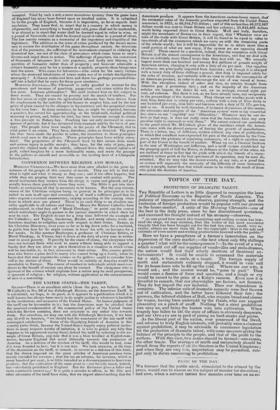THE UNITED STATES—THE TARIFF.
GLOBE—There is an excellent article (from the pen, we believe, of Mr. 11‘Culloch) in No. 96 of the Edinburgh Review, on the American Tariff. It is calculated, we hope, to do good, as it appears in a publication which it is well known has always been ready to do ample justice to whatever is laudable in the institutions and measures of the United States. No honest judgment of the tariff can be favourable to it ; but the Americans may be satisfied that the unmixed condemnation of the commercial policy of the United States which the Review contains, does not originate in any unfair bias towards them. For ourselves, we may say with the Edinburgh Reviewer, if we bore
any to America, "we should hail the enactment of the late tariff with unmingled satisfaction." Some of the ill-judging friends of America in this country (who think, because the United States happily enjoy political institu- tions in many respects worthy of imitation, it is wise to praise any folly that happens to be uppermost among them) defend the tariff by referring to the ex- ample of Great Britain, and state that it was a blow levelled at English com- merce, because England had acted illiberally towards the commerce of America. As a defence of the wisdom of the tariff, this would be bad, even if it were founded in fact; but it is not true. We took occasion, at the time of the discussion on the tariff, to remark, in answer to a defence of this kind, that the duties imposed on the great articles of American produce were mainly intended for revenue ; that the tax on tobacco, for instance, which is many hundred per cent., is so little intended as a discouragement to American produce, that the cultivation of the same plant is—not heavily taxed, indeed, but—absolutely prohibited in England. But the Reviewer gives a fuller and more conclusive answer It is quite a mistake to affirm, as Mr. Otis and other advocates of the tariff have done, that we import almost nothing that the Americans produce. It appears from the American custom-house report, that' the estimated value of the domestic produce exported from the United States
amounted, in 1825, to 66,944,745 dollars; and of this no less than 40,372,987. dollars worth was sent to Great Britain and her colonies; 35,043,466 dollars worth being exported direct to Great Britain. Well and truly, therefore, might the merchants of Boston say in their report, that Whatever view we take of the trade with Great Britain, it will be found to be equal ht. value to two-thirds of all the commerce which we carry on with the remaining pasts
of the whole world; but it will be impossible for us to retain more them a small portion of what we now enjoy, if the system we are opposing shouldl
prevail.' There cannot be a question, indeed, that the commerce with Great. Britain is of the utmost consequence to the Americans, and that we deal with. them on infinitely more liberal terms than they deal with us. We annually import more than one hundred and twenty five millions of pounds weight of American cotton, charging it only with a duty of six per cent. Our supplies: of tobacco are principally imported from America ; and though it is charged' with a heavy duty of three shillings a pound, that duty is imposed solely for the sake of revenue, and certainly with no view to check the consumption or an American product, in order to encourage the use of one raised at home. With the exception indeed of ashes and rice, no articles brought from. America pay a protecting duty ; and on the majority of the American. articles we import, the duties do not, on an average, exceed eight per cent, ad valorem. But there is not, as we have already seen, any reciprocity in the proceedings of the Americans. They charge our woollen goods with a duty from forty-live to ninety per cent., cottons with a duty of from thirty to one hundred per cent., iron bolts and bar-iron with a duty of 7/. 17.s. per ton, and so on. It would be well, therefore, if in future discussions of this matter, the advocates and eulogists of the American system' were to lay somewhat less stress on our cupidity' and illiberality.' Whatever may be our de- fects in that way, it does not really seem that the Americans have any very peculiar right to reproach us with them." We cannot extend our quotations to the proof which Mr. M'Culloch gives of the sacrifices which the Ameri- cans make with the absurd purpose of forcing the growth of manufactures, There is a letter, too, of Jefferson, written without any view of publication„ - in which that excellent man expressed his pain at the assumption by the Con- gress, under the pretence of regulating commerce, of a right to sacrifice onn part of the Union to the benefit of another. When we sec a General Jackson in the seat of Washington and Jefferson, and a tariff system established by the grasping spirit of half the Union, in defiance of the rights of the other, wn are inclined at times to fear that the pride with which the friends of a repre- sentative system point at the best specimen of its operation, may be soon di.. minished. But we may take the recent events, at any rate, as a proof that no system will supersede the necessity of the diffusion of some instruction among a people, better than that which seems to be within the reach of those. who guide the destinies of America.


















 Previous page
Previous page